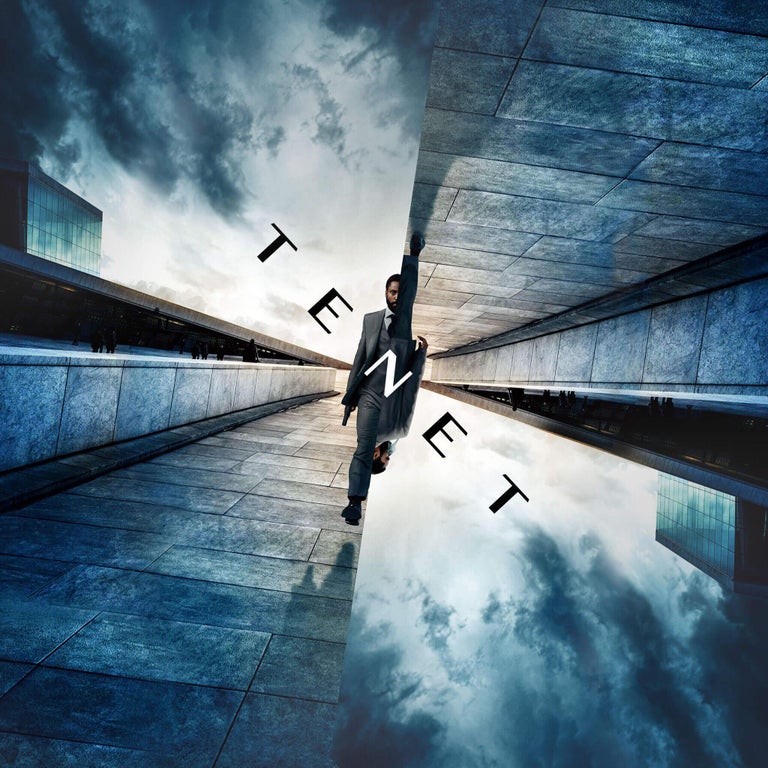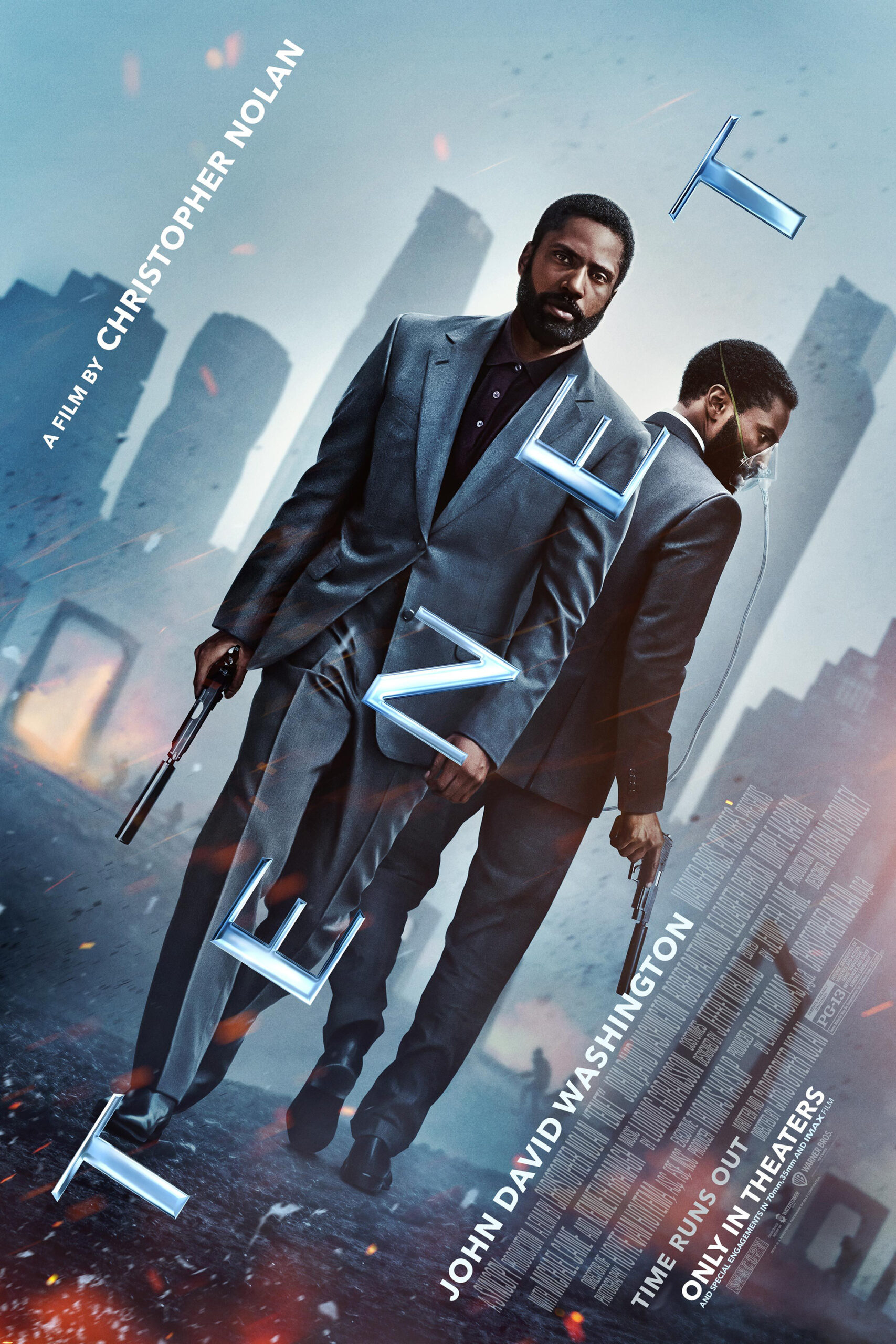

If you enjoy the subject of time travel, chances are you have had some long, confusing thoughts about how traveling back in time would affect the future. There is for instance the grandfather-paradox: if you travel back in time and kill your grandfather before he had the chance to conceive one of your parents, what happens to you? Killing him would mean one of your parents would never have had existed, which leads to you never being born. But if you were never born, then how could you go back in time to kill your grandfather in the first place? The fact that you could go back in time to kill your grandfather means you were born, and thus your grandfather must have conceived one of your parents as well – so he didn’t get killed. See the troubling and confusing thoughts time travel can bring? If you go and watch Christopher Nolan’s new film Tenet (2020), chances are you will have these kinds of thoughts throughout most of the film, since it’s based on a new concept of time travel.
In the Tenet, we see how the protagonist (John David Washington, literally called ‘the protagonist’ in the film), a secret agent, gets involved in saving the world from an apocalypse – a concept which, by itself, is not very original or complicated. However, this apocalypse won’t be nuclear, like in many films, but ‘temporal’. It turns out that people in the future have worked out a way to change – or more accurately ‘reverse’ the entropy of objects and people. This means that they can effectively make things go ‘backwards in time’ instead of forward. An example of this is being able to suck bullets out of walls with pistols instead of shooting them into the wall. This time reversal is different from a more ‘traditional’ type of time travel, where you can take some kind of machine and instantly go back in time to stop, for example, a world war. In Tenet, if you want to go back in time for a year, you have to have your entropy reversed and ‘live backwards’ for a year. The same applies to objects. The whole film is based on this hard-to-grasp concept, of reversing time on objects or people.
The plot of the movie is very well thought out, with many scenes having significance later on, creating a story that is some kind of complicated ‘temporal puzzle’. While this is an impressive feat, I feel like Nolan has made this ‘puzzle’ a bit too complicated. Throughout most of the film I was confused about what was exactly happening. For instance, you see people and objects moving backwards throughout the film, implying they have been reversed and are going back in time. However, it is often not very clear why that’s happening in a given scene and what the meaning of it is. You have to try and figure it out for yourself. When I watch a film, I like to understand what’s happening in the plot. Now it’s fun if you have to put some effort in understanding a plot or timeline, like in Nolan’s Inception (2010) or Quentin Tarantino’s famous Pulp Fiction (1994). In Tenet, however, most of the time it is too hard to figure out what’s happening. The hints and explanations given in the film are not enough to understand the whole puzzle. This complexity made me think hard about what was happening throughout most of the film – and even when I returned home, I was still confused about the plot. As explained with the grandfather-paradox, time travel gets confusing really fast. Therefore, I think it could have been nice if clearer explanations were given in the film about what was happening, making it easier to follow.
Even though Nolan might give you a hard time understanding what is happening in Tenet, the action, soundtrack and fast pace of the film are all on point. With cars driving backwards, buildings exploding, coming back together and exploding again all at once, the film is a pleasure to watch. It is a lot of ‘new’ action for the first blockbuster film that has come out since the theatres have reopened. So even if you don’t fully understand what’s happening in the film, it’s still a joy to watch if it were only for the cinematography. Maybe the twisted, confusing reality of time in Tenet actually reflects our current reality in a way. Time seems to have become more relative and less linear during self-quarantine and most of us are confused about what’s happening in (and to) our reality as well. Perhaps Tenet can offer a brief, confusing escape from our new reality.
Directed by: Christopher Nolan
Tenet was released on the 26th of August and can now be viewed in your local theatre.

If you enjoy the subject of time travel, chances are you have had some long, confusing thoughts about how traveling back in time would affect the future. There is for instance the grandfather-paradox: if you travel back in time and kill your grandfather before he had the chance to conceive one of your parents, what happens to you? Killing him would mean one of your parents would never have had existed, which leads to you never being born. But if you were never born, then how could you go back in time to kill your grandfather in the first place? The fact that you could go back in time to kill your grandfather means you were born, and thus your grandfather must have conceived one of your parents as well – so he didn’t get killed. See the troubling and confusing thoughts time travel can bring? If you go and watch Christopher Nolan’s new film Tenet (2020), chances are you will have these kinds of thoughts throughout most of the film, since it’s based on a new concept of time travel.
In the Tenet, we see how the protagonist (John David Washington, literally called ‘the protagonist’ in the film), a secret agent, gets involved in saving the world from an apocalypse – a concept which, by itself, is not very original or complicated. However, this apocalypse won’t be nuclear, like in many films, but ‘temporal’. It turns out that people in the future have worked out a way to change – or more accurately ‘reverse’ the entropy of objects and people. This means that they can effectively make things go ‘backwards in time’ instead of forward. An example of this is being able to suck bullets out of walls with pistols instead of shooting them into the wall. This time reversal is different from a more ‘traditional’ type of time travel, where you can take some kind of machine and instantly go back in time to stop, for example, a world war. In Tenet, if you want to go back in time for a year, you have to have your entropy reversed and ‘live backwards’ for a year. The same applies to objects. The whole film is based on this hard-to-grasp concept, of reversing time on objects or people.
The plot of the movie is very well thought out, with many scenes having significance later on, creating a story that is some kind of complicated ‘temporal puzzle’. While this is an impressive feat, I feel like Nolan has made this ‘puzzle’ a bit too complicated. Throughout most of the film I was confused about what was exactly happening. For instance, you see people and objects moving backwards throughout the film, implying they have been reversed and are going back in time. However, it is often not very clear why that’s happening in a given scene and what the meaning of it is. You have to try and figure it out for yourself. When I watch a film, I like to understand what’s happening in the plot. Now it’s fun if you have to put some effort in understanding a plot or timeline, like in Nolan’s Inception (2010) or Quentin Tarantino’s famous Pulp Fiction (1994). In Tenet, however, most of the time it is too hard to figure out what’s happening. The hints and explanations given in the film are not enough to understand the whole puzzle. This complexity made me think hard about what was happening throughout most of the film – and even when I returned home, I was still confused about the plot. As explained with the grandfather-paradox, time travel gets confusing really fast. Therefore, I think it could have been nice if clearer explanations were given in the film about what was happening, making it easier to follow.
Even though Nolan might give you a hard time understanding what is happening in Tenet, the action, soundtrack and fast pace of the film are all on point. With cars driving backwards, buildings exploding, coming back together and exploding again all at once, the film is a pleasure to watch. It is a lot of ‘new’ action for the first blockbuster film that has come out since the theatres have reopened. So even if you don’t fully understand what’s happening in the film, it’s still a joy to watch if it were only for the cinematography. Maybe the twisted, confusing reality of time in Tenet actually reflects our current reality in a way. Time seems to have become more relative and less linear during self-quarantine and most of us are confused about what’s happening in (and to) our reality as well. Perhaps Tenet can offer a brief, confusing escape from our new reality.
Directed by: Christopher Nolan
Tenet was released on the 26th of August and can now be viewed in your local theatre.



